英语高阶教程(陈静)第五单元中文翻译
- 格式:docx
- 大小:20.70 KB
- 文档页数:4
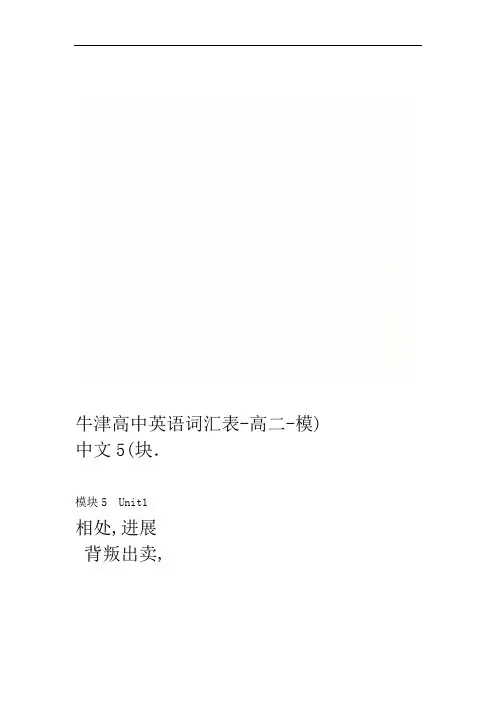
牛津高中英语词汇表-高二-模) 中文5(块.模块5 Unit1相处,进展背叛出卖,的初初步级的 ,小学学习良好的.学术的笨的,愚蠢的俯瞰,略忽,忽视后来然后,兴高的的,愉快承认的意故信守诺言誓发原谅,宽恕奚落, 笑取,嘲笑友谊难中于处烦麻有,困尴尬的处境出秀优,的的杰集中注意力的焉在不心.结果吼叫,大叫卑鄙的刻薄的,的罪的 ,内疚有刻毒的,伤人的,残酷的容忍,忍让,经受别扭的,不自然的歉道 ,友好的开朗的,痛的怀恨,苦苦的的适合做运动员的利权不太可能的责备,责谴怀疑疑惑, 举止为行,妒忌的嫉妒的, 窘使尬使尴,困 ,在公共场合当众的有,的赋有天才力气,力量实力, 友队不公平的顽固的,固执的分岐,意见不同灭破坏,毁便耽搁,拖延,拖迟邮箱,劝说说服球羽毛碟片录记笔记, 牙科医生数代算术节活复消遣娱乐,场游乐 ,马戏表演马戏团当心 ,保重心,小每天的日常的, 身份劝阻阻止, 事某做止阻荒唐的,荒诞的短文,论文,散文惩罚域区,区地难受的,难熬的焦急的,焦虑的忍受痛苦受损害,际的,实实用的免费的线路等电话线的电话等的接通惑,使困惑不使迷解公寓,房间发沙吸引吸收,注的,的投入专究竟,到底势星运座看法,态度的一致全世界的的期春青.犹豫,迟疑不决做出反应,回应犹豫,迟疑不决互,互相相,不顾不管Unit21.经济44.状态,状况,情形2.环境保护论者,环境论者使震惊,使震动45.人3.电持视节目主使失望46.家济 4.经学47.打扫,清扫论争辩争辩5.论,,昆虫48.环境的,与环境有关6.的 49.可耻的事(或人)羞耻,羞愧存保,护保7.50. 爱好者,情人8.工业的51.逮捕,拘捕的可怕 9.52.非法地10.有毒的53.海关围氛,空气气氛,11.大气,官员,公务员,军官,警官54. 动12.流到达者,到达物,到达55. 染13.污 56.仔细地,认真地加14.加,增 57.羽毛外15.另 58.胃,肚子擦去,16.擦 59.乌龟灭消除17.扫,明显地,显然地60. 放摆,置放,蛋下,卵产18.61.毯子19.数字资源62.近,接靠近20.63.有限的少减减,缩减,21.削64.声明,陈述产生22. 65.强有力地23.有益的,有利的,有帮助的鼓掌,拍手66.大扩,扩24.展67.沙漠化,荒漠化25.环境上,与环境有关的可耕种的,可耕作的68.生绅26.士先, 69.国家,民族的,易显的而见显27.明 70.战斗,抗击势情势,形28. 公约,协定,习俗,惯例71. 管导,子管29.72.建立,创立,设立30.责任,职责73.栅栏,篱笆的经经济的,上济 31.尘土,污物74.的稳定 32. 灌木,矮树75.人33.敌减少76.的案,关 34.答键,键关东北方(的)77.的效35.有以…的形式78.察36.检视督,查监,装备,储备79.乐意37.的,自愿的储备有。
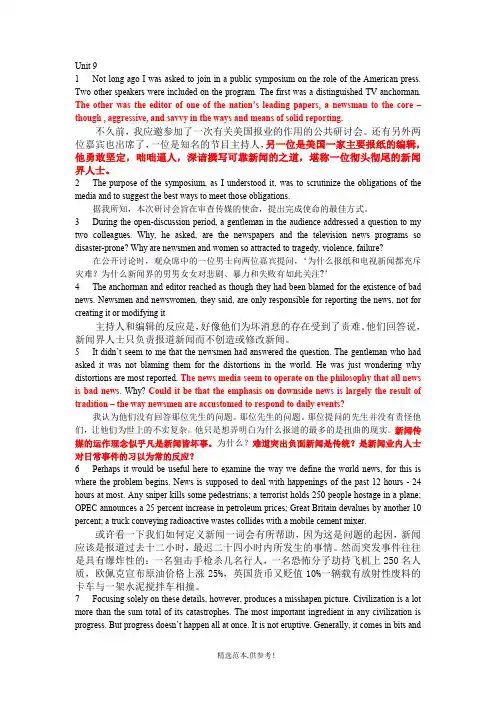
Unit 91 Not long ago I was asked to join in a public symposium on the role of the American press. Two other speakers were included on the program. The first was a distinguished TV anchorman. The other was the editor of one of the nation’s leading papers, a newsman to the core –though , aggressive, and savvy in the ways and means of solid reporting.不久前,我应邀参加了一次有关美国报业的作用的公共研讨会。
还有另外两位嘉宾也出席了,一位是知名的节目主持人,另一位是美国一家主要报纸的编辑,他勇敢坚定,咄咄逼人,深谙撰写可靠新闻的之道,堪称一位彻头彻尾的新闻界人士。
2 The purpose of the symposium, as I understood it, was to scrutinize the obligations of the media and to suggest the best ways to meet those obligations.据我所知,本次研讨会旨在审查传媒的使命,提出完成使命的最佳方式。
3 During the open-discussion period, a gentleman in the audience addressed a question to my two colleagues. Why, he asked, are the newspapers and the television news programs so disaster-prone? Why are newsmen and women so attracted to tragedy, violence, failure?在公开讨论时,观众席中的一位男士向两位嘉宾提问,‘为什么报纸和电视新闻都充斥灾难?为什么新闻界的男男女女对悲剧、暴力和失败有如此关注?’4 The anchorman and editor reached as though they had been blamed for the existence of bad news. Newsmen and newswomen, they said, are only responsible for reporting the news, not for creating it or modifying it主持人和编辑的反应是,好像他们为坏消息的存在受到了责难。
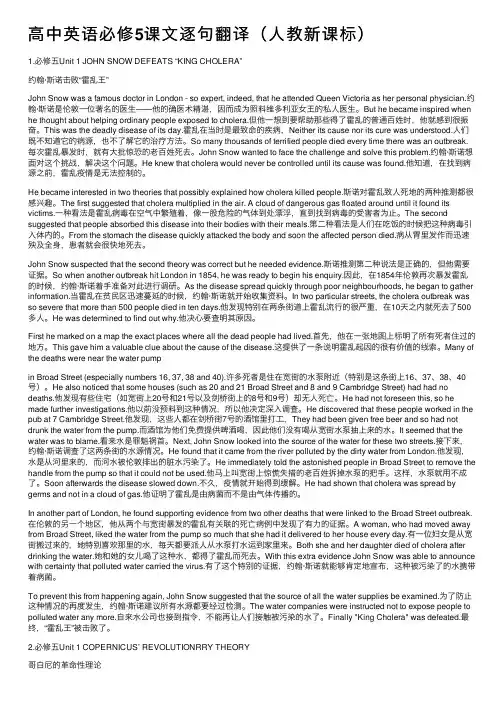
⾼中英语必修5课⽂逐句翻译(⼈教新课标)1.必修五Unit 1 JOHN SNOW DEFEATS “KING CHOLERA”约翰·斯诺击败“霍乱王”John Snow was a famous doctor in London - so expert, indeed, that he attended Queen Victoria as her personal physician.约翰·斯诺是伦敦⼀位著名的医⽣——他的确医术精湛,因⽽成为照料维多利亚⼥王的私⼈医⽣。
But he became inspired when he thought about helping ordinary people exposed to cholera.但他⼀想到要帮助那些得了霍乱的普通百姓时,他就感到很振奋。
This was the deadly disease of its day.霍乱在当时是最致命的疾病,Neither its cause nor its cure was understood.⼈们既不知道它的病源,也不了解它的治疗⽅法。
So many thousands of terrified people died every time there was an outbreak.每次霍乱暴发时,就有⼤批惊恐的⽼百姓死去。
John Snow wanted to face the challenge and solve this problem.约翰·斯诺想⾯对这个挑战,解决这个问题。
He knew that cholera would never be controlled until its cause was found.他知道,在找到病源之前,霍乱疫情是⽆法控制的。
He became interested in two theories that possibly explained how cholera killed people.斯诺对霍乱致⼈死地的两种推测都很感兴趣。
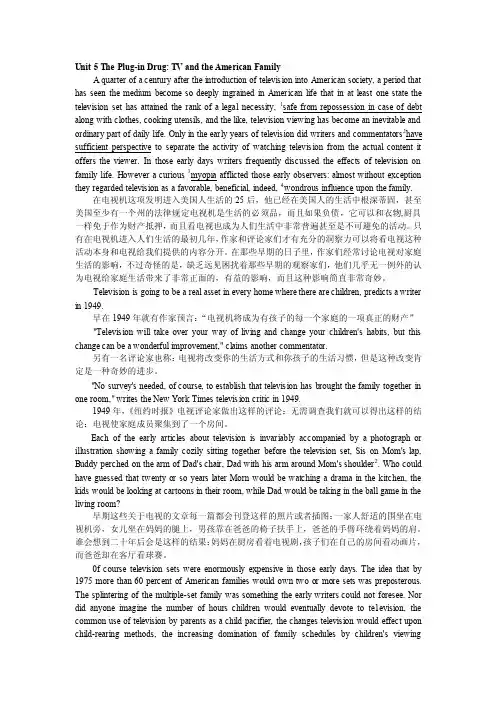
Unit 5 The Plug-in Drug: TV and the American FamilyA quarter of a century after the introduction of television into American society, a period that has seen the medium become so deeply ingrained in American life that in at least one state the television set has attained the rank of a legal necessity, 1safe from repossession in case of debt along with clothes, cooking utensils, and the like, television viewing has become an inevitable and ordinary part of daily life. Only in the early years of television did writers and commentators2have sufficient perspective to separate the activity of watching television from the actual content it offers the viewer. In those early days writers frequently discussed the effects of television on family life. However a curious 3myopia afflicted those early observers: almost without exception they regarded television as a favorable, beneficial, indeed, 4wondrous influence upon the family.在电视机这项发明进入美国人生活的25后,他已经在美国人的生活中根深蒂固,甚至美国至少有一个州的法律规定电视机是生活的必须品,而且如果负债,它可以和衣物,厨具一样免于作为财产抵押,而且看电视也成为人们生活中非常普遍甚至是不可避免的活动。
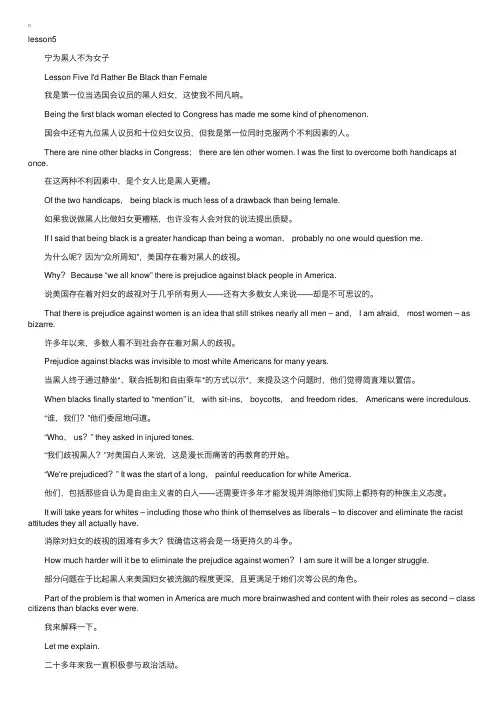
lesson5 宁为⿊⼈不为⼥⼦ Lesson Five I'd Rather Be Black than Female 我是第⼀位当选国会议员的⿊⼈妇⼥,这使我不同凡响。
Being the first black woman elected to Congress has made me some kind of phenomenon. 国会中还有九位⿊⼈议员和⼗位妇⼥议员,但我是第⼀位同时克服两个不利因素的⼈。
There are nine other blacks in Congress; there are ten other women. I was the first to overcome both handicaps at once. 在这两种不利因素中,是个⼥⼈⽐是⿊⼈更糟。
Of the two handicaps, being black is much less of a drawback than being female. 如果我说做⿊⼈⽐做妇⼥更糟糕,也许没有⼈会对我的说法提出质疑。
If I said that being black is a greater handicap than being a woman, probably no one would question me. 为什么呢?因为“众所周知”,美国存在着对⿊⼈的歧视。
Why? Because “we all know” there is prejudice against black people in America. 说美国存在着对妇⼥的歧视对于⼏乎所有男⼈——还有⼤多数⼥⼈来说——却是不可思议的。
That there is prejudice against women is an idea that still strikes nearly all men – and, I am afraid, most women – as bizarre. 许多年以来,多数⼈看不到社会存在着对⿊⼈的歧视。
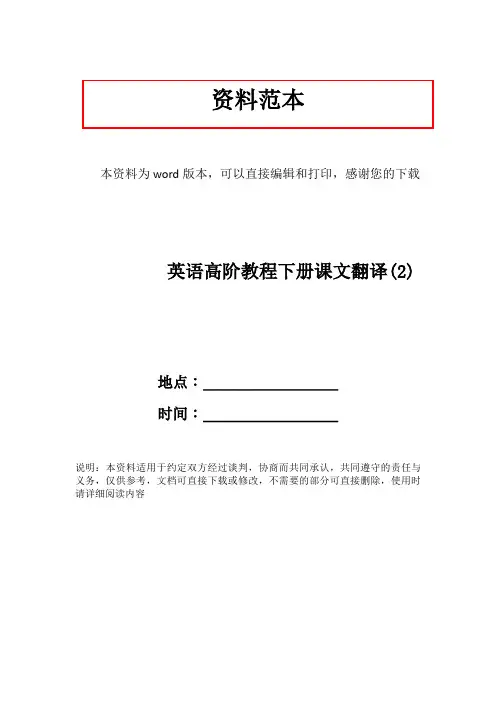
资料范本本资料为word版本,可以直接编辑和打印,感谢您的下载英语高阶教程下册课文翻译(2)地点:__________________时间:__________________说明:本资料适用于约定双方经过谈判,协商而共同承认,共同遵守的责任与义务,仅供参考,文档可直接下载或修改,不需要的部分可直接删除,使用时请详细阅读内容英语高阶教程下册课文翻译第一单元为什么我们爱上了自己的爱人By Dr. Joyce Brothers你知道吗?一对已婚夫妇曾经看起来本不那么合适——而现在,他们都享受着婚姻生活,你知道其中缘由吗?我就认识这么一对夫妻:他,身材健壮的前退役运动员,还是个出色的销售员,在少年联盟球队(Little League)当教练,活跃于扶轮社(Rotary Club),每周六都和朋友打高尔夫球。
而她,纤细安静,完全就是个居家女子,甚至都不喜欢和朋友外出吃饭。
是何种神秘的力量使我们投入另一个人的怀抱?同时,还使我们不再爱其他任何人,即便在没有偏见的旁人眼中他们和我们的爱人看上去应同样合我们心意?根据曾在约翰斯·霍普金斯大学从事医学心理学和儿科学的名誉HYPERLINK "/%E9%80%80%E4%BC%91/" \t "_blank" 退休教授约翰·莫奈的研究,在影响我们择偶的诸多因素中,最说明问题的是一种被称为“爱图”的东西:它是我们大脑中的一组编码信息,记载着我们的爱憎。
据约翰.霍普金斯大学医学心理学科学院院士John Money教授说,我们心目种理想伴侣的形象,受到很多因素影响,其中最关键的一项,就是他所说的“爱情地图”——将自己喜欢什么讨厌什么,在脑中编码而成一组信息。
显示我们对头发和眼睛颜色的偏好,还有声音,气味,身材。
还记录了吸引我们的那种性格,无论是温柔友善型还是寡言坚强型。
简单来说,我们爱上那些最符合自己爱情地图的类型,然后展开追求。
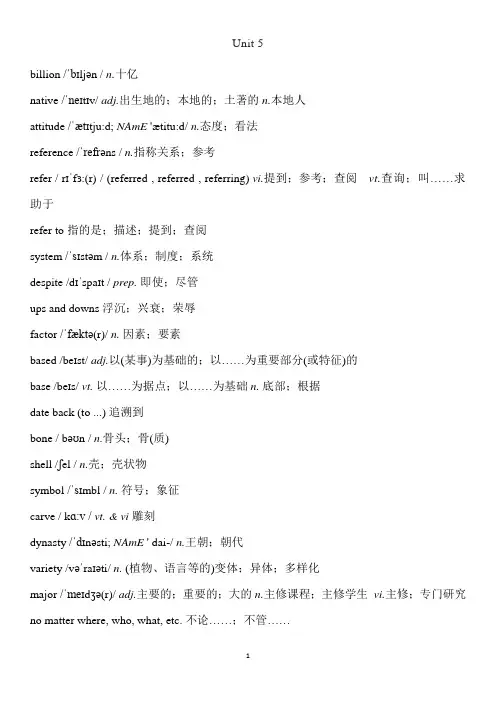
Unit 5billion /ˈbɪljən / n.十亿native /ˈneɪtɪv/ adj.出生地的;本地的;土著的 n.本地人attitude /ˈætɪtju:d; NAmE 'ætitu:d/ n.态度;看法reference /ˈrefrəns / n.指称关系;参考refer / rɪˈfɜ:(r) / (referred , referred , referring) vi.提到;参考;查阅vt.查询;叫……求助于refer to指的是;描述;提到;查阅system /ˈsɪstəm / n.体系;制度;系统despite /dɪˈspaɪt / prep.即使;尽管ups and downs 浮沉;兴衰;荣辱factor /ˈfæktə(r)/ n. 因素;要素based /beɪst/ adj.以(某事)为基础的;以……为重要部分(或特征)的base /beɪs/ vt.以……为据点;以……为基础n. 底部;根据date back (to ...) 追溯到bone / bəʊn / n.骨头;骨(质)shell /ʃel / n.壳;壳状物symbol /ˈsɪmbl / n. 符号;象征carve / kɑ:v /vt. & vi 雕刻dynasty /ˈdɪnəsti; NAmE ' dai-/ n.王朝;朝代variety /vəˈraɪəti/ n. (植物、语言等的)变体;异体;多样化major /ˈmeɪdʒə(r)/ adj.主要的;重要的;大的n.主修课程;主修学生 vi.主修;专门研究no matter where, who, what, etc. 不论……;不管……dialect /'daɪəlekt/ n.地方话;方言means /mi:nz/ n.方式;方法;途径classic /ˈklæsɪk/ adj.传统的;最优秀的;典型的n.经典作品;名著regard /rɪˈgɑ:d/n.尊重;关注 vt.把……视为;看待character /'kærəktə(r)/ n.文字;符号;角色;品质;特点calligraphy / kəˈlɪɡrəfi / n.书法;书法艺术global /'gləʊbəl/ adj.全球的;全世界的affair /əˈfeə(r)/ n.公共事务;事件;关系appreciate /ə'pri:ʃieɪt / vt.欣赏;重视;感激;领会 vi.增值specific /spəˈsɪfɪk/ adj.特定的;明确的;具体的CE /ˌsi:ˈi:/ (Common Era) 公元struggle /ˈstrʌgl/ n.&vi.斗争;奋斗;搏斗tongue /tʌŋ/n.舌头;语言point of view观点;看法semester /sɪˈmestə(r)/ n.学期gas /ɡæs/n.汽油;气体;燃气petrol /'petrəl/ n. (NAmE gas ) 汽油subway /'sʌbweɪ/ n.(BrE underground) 地铁apartment /ə'pɑ:tmənt/n.(especially NAmE) 公寓套房pants / pænts / n. [pl.] (BrE )内裤;短裤;(especially NAmE )裤子beg /beg/ vt.恳求;祈求;哀求equal /'i:kwəl / n.同等的人;相等物adj. 相同的;同样的gap /gæp/ n.间隔;开口;差距demand /dɪˈmɑ:nd/n.要求;需求vt. 强烈要求;需要vi.查问vocabulary /və'kæbjələri ; NAmE -leri / n.词汇description /dɪˈskrɪpʃn/ n.描写(文字);形容relate /rɪˈleɪt / vt.联系;讲述relate to 与……相关;涉及;谈到THE CHINESE WRITING SYSTEM:CONNECTING THE PAST AND THE PRESENT汉语书写体系:连接古今China is widely known for its ancient civilisation which has continued all the way through into modern times, despite the many ups and downs in its history. There are many reasons why this has been possible, but one of the main factors has been the Chinese writing system.尽管历史跌宕起伏,中国因其古老文明一直延续至今而闻名于世。
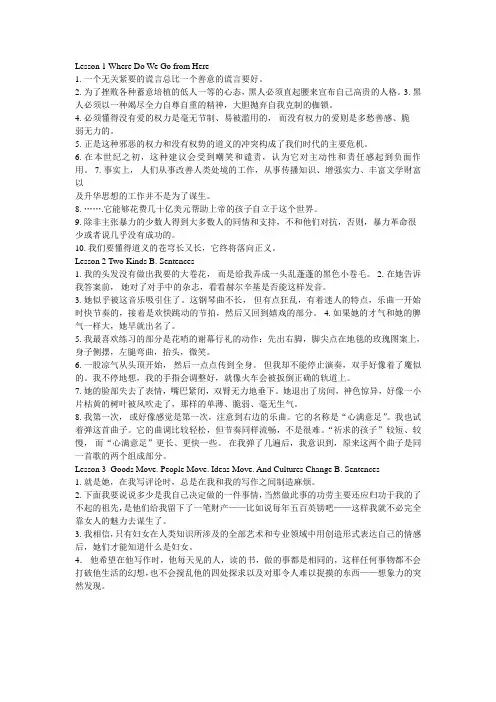
Lesson 1 Where Do We Go from Here1. 一个无关紧要的谎言总比一个善意的谎言要好。
2. 为了挫败各种蓄意培植的低人一等的心态,黑人必须直起腰来宣布自己高贵的人格。
3. 黑人必须以一种竭尽全力自尊自重的精神,大胆抛弃自我克制的枷锁。
4. 必须懂得没有爱的权力是毫无节制、易被滥用的,而没有权力的爱则是多愁善感、脆弱无力的。
5. 正是这种邪恶的权力和没有权势的道义的冲突构成了我们时代的主要危机。
6. 在本世纪之初,这种建议会受到嘲笑和谴责,认为它对主动性和责任感起到负面作用。
7. 事实上,人们从事改善人类处境的工作,从事传播知识、增强实力、丰富文学财富以及升华思想的工作并不是为了谋生。
8. …….它能够花费几十亿美元帮助上帝的孩子自立于这个世界。
9. 除非主张暴力的少数人得到大多数人的同情和支持,不和他们对抗,否则,暴力革命很少或者说几乎没有成功的。
10. 我们要懂得道义的苍穹长又长,它终将落向正义。
Lesson 2 Two Kinds B. Sentences1. 我的头发没有做出我要的大卷花,而是给我弄成一头乱蓬蓬的黑色小卷毛。
2. 在她告诉我答案前,她对了对手中的杂志,看看赫尔辛基是否能这样发音。
3. 她似乎被这音乐吸引住了。
这钢琴曲不长,但有点狂乱,有着迷人的特点,乐曲一开始时快节奏的,接着是欢快跳动的节拍,然后又回到嬉戏的部分。
4. 如果她的才气和她的脾气一样大,她早就出名了。
5. 我最喜欢练习的部分是花哨的谢幕行礼的动作:先出右脚,脚尖点在地毯的玫瑰图案上,身子侧摆,左腿弯曲,抬头,微笑。
6. 一股凉气从头顶开始,然后一点点传到全身。
但我却不能停止演奏,双手好像着了魔似的。
我不停地想,我的手指会调整好,就像火车会被扳倒正确的轨道上。
7. 她的脸部失去了表情,嘴巴紧闭,双臂无力地垂下。
她退出了房间,神色惊异,好像一小片枯黄的树叶被风吹走了,那样的单薄、脆弱、毫无生气。
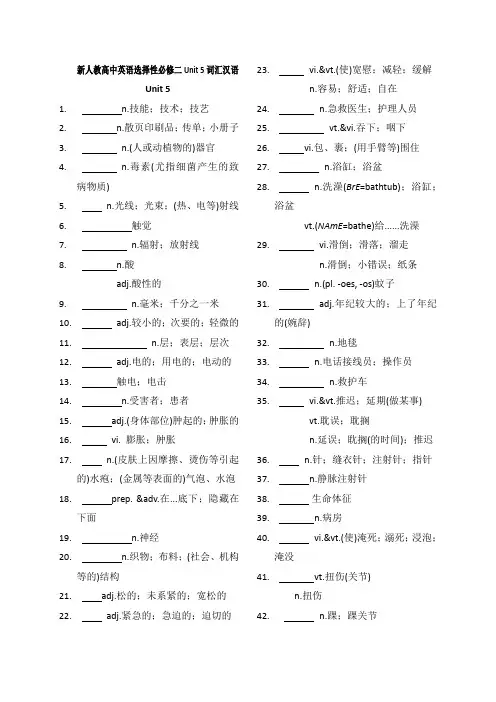
新人教高中英语选择性必修二Unit 5词汇汉语Unit 51.n.技能;技术;技艺2.n.散页印刷品;传单;小册子3.n.(人或动植物的)器官4.n.毒素(尤指细菌产生的致病物质)5.n.光线;光束;(热、电等)射线6.触觉7.n.辐射;放射线8.n.酸adj.酸性的9.n.毫米;千分之一米10.adj.较小的;次要的;轻微的11.n.层;表层;层次12.adj.电的;用电的;电动的13.触电;电击14.n.受害者;患者15.adj.(身体部位)肿起的;肿胀的16.vi. 膨胀;肿胀17.n.(皮肤上因摩擦、烫伤等引起的)水疱;(金属等表面的)气泡、水泡18.prep. &adv.在...底下;隐藏在下面19.n.神经20.n.织物;布料;(社会、机构等的)结构21.adj.松的;未系紧的;宽松的22.adj.紧急的;急迫的;迫切的23.vi.&vt.(使)宽慰;减轻;缓解n.容易;舒适;自在24.n.急救医生;护理人员25.vt.&vi.吞下;咽下26.vi.包、裹;(用手臂等)围住27.n.浴缸;浴盆28.n.洗澡(BrE=bathtub);浴缸;浴盆vt.(NAmE=bathe)给......洗澡29.vi.滑倒;滑落;溜走n.滑倒;小错误;纸条30.n.(pl. -oes, -os)蚊子31.adj.年纪较大的;上了年纪的(婉辞)32.n.地毯33.n.电话接线员;操作员34.n.救护车35.vi.&vt.推迟;延期(做某事)vt.耽误;耽搁n.延误;耽搁(的时间);推迟36.n.针;缝衣针;注射针;指针37.n.静脉注射针38.生命体征39.n.病房40.vi.&vt.(使)淹死;溺死;浸泡;淹没41.vt.扭伤(关节)n.扭伤42.n.踝;踝关节43.n.流血;失血44.vi. 流血;失血45.vi.&vt.(使)惊慌n.惊恐;恐慌46.vi.&vt.打断;打扰vt.使暂停;使中断47.vi.&vt.(因愤怒或恐惧)高声喊;大声叫n.尖叫;尖锐刺耳的声音48.adj.同类的;同事的;同伴的;同情况的n.男人;家伙;同事;同辈;同类49.n.(尤指餐馆的)就餐者50.vi.&vt.(使)窒息;(使)哽咽51.n.牛排;肉排52.n.咽喉;喉咙53.adj.绝望的;孤注一掷的;非常需要的54.vt.(用手掌)打、拍n.(用手掌)打、拍;拍击声55.帮助某人站起身来56.adj.切实可行的;实际的;实践的57.n.阻碍;堵塞;阻塞物58.n.拳;拳头59.vt.抓住;攫取n.抓取;抢夺60.adv.紧紧地;牢固地;紧密地61.adj.牢固的;紧身的;绷紧的;严密的adv.紧紧地;牢固地62.n.运动;移动63.面朝上(朝下)64.n.证明......有道理;为...辩护;是......的正当理由65.n.幸福;福祉;安康;福利66.vi.(突然)倒塌;(因病等)昏倒67.n.使用手册;说明书adj.用手的;手工的;体力的;手控的68.迟起;睡过头;睡懒觉69.健康状况不好70.adj.有雾的71.n.郊区;城外72.n.会员身份;全体会员;会员人数73.泰勒74.bbr.心肺复苏(包括人工呼吸和体外心脏按压)75.口对口人工呼吸76.海姆利希急救法。
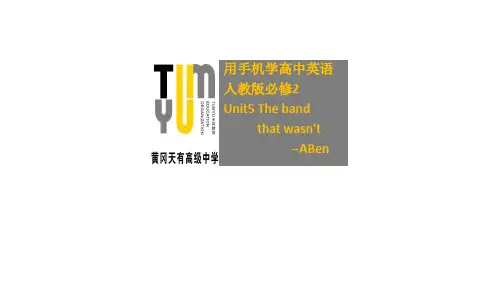
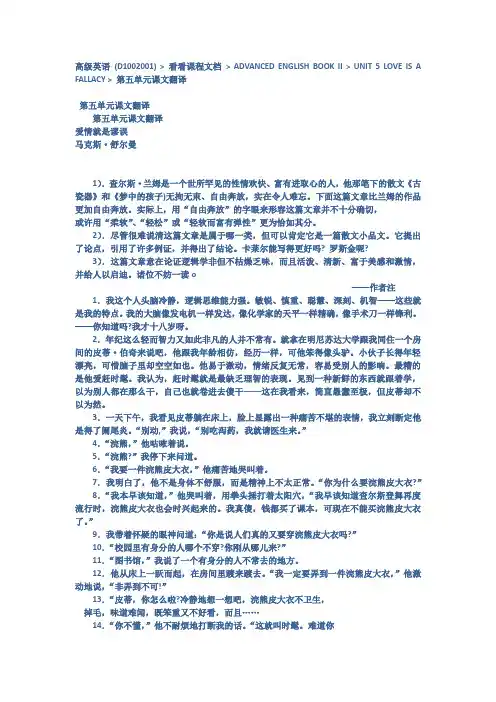
高级英语(D1002001) >看看课程文档> ADVANCED ENGLISH BOOK II > UNIT 5 LOVE IS A FALLACY >第五单元课文翻译第五单元课文翻译第五单元课文翻译爱情就是谬误马克斯·舒尔曼1).查尔斯·兰姆是一个世所罕见的性情欢快、富有进取心的人,他那笔下的散文《古瓷器》和《梦中的孩子)无拘无束、自由奔放,实在令人难忘。
下面这篇文章比兰姆的作品更加自由奔放。
实际上,用“自由奔放”的字眼来形容这篇文章并不十分确切,或许用“柔软”、“轻松”或“轻软而富有弹性”更为恰如其分。
2).尽管很难说清这篇文章是属于哪一类,但可以肯定它是一篇散文小品文。
它提出了论点,引用了许多例证,并得出了结论。
卡莱尔能写得更好吗? 罗斯金呢?3).这篇文章意在论证逻辑学非但不枯燥乏味,而且活泼、清新、富于美感和激情,并给人以启迪。
诸位不妨一读o——作者注1.我这个人头脑冷静,逻辑思维能力强。
敏锐、慎重、聪慧、深刻、机智——这些就是我的特点。
我的大脑像发电机一样发达,像化学家的天平一样精确,像手术刀一样锋利。
——你知道吗?我才十八岁呀。
2.年纪这么轻而智力又如此非凡的人并不常有。
就拿在明尼苏达大学跟我同住一个房间的皮蒂·伯奇来说吧,他跟我年龄相仿,经历一样,可他笨得像头驴。
小伙子长得年轻漂亮,可惜脑子里却空空如也。
他易于激动,情绪反复无常,容易受别人的影响。
最糟的是他爱赶时髦。
我认为,赶时髦就是最缺乏理智的表现。
见到一种新鲜的东西就跟着学,以为别人都在那么干,自己也就卷进去傻干——这在我看来,简直愚蠢至极,但皮蒂却不以为然。
3.一天下午,我看见皮蒂躺在床上,脸上显露出一种痛苦不堪的表情,我立刻断定他是得了阑尾炎。
“别动,”我说,“别吃泻药,我就请医生来。
”4.“浣熊,”他咕哝着说。
5.“浣熊?”我停下来问道。
6.“我要一件浣熊皮大衣,”他痛苦地哭叫着。
Unit 5 Fourteen StepsHal Manwaring1 They say a cat has nine lives, 1 and I am inclined to think that possible since I amnow living my third life and I ’ m not even a cat. My first life began on a clear, cold day in November 1934, when I arrived as the sixth of eight children of a farming family.My father died when I was 15, and we had a hard struggle to make a living. As thechildren grew up, they married, leaving only one sister and myself to support andcare for Mother, who became paralyzed in her last years and died while still in her60s. My sister married soon after, and I followed her example within the year.2This was when I began to enjoy my first life. I was very happy, in excellent health, and quite a good athlete. My wife and I became the parents of two lovely girls.I had a good job in San Jose and a beautiful home up the peninsula in San Carlos.Life was a pleasant dream. Then the dream ended. I became afflicted with a slowlyprogressive disease of the motor nerves, affecting first my right arm and leg, and then my other side. Thus began my second life ⋯3 In spite of my disease I still drove to and from work each day, with the aid ofspecial equipment installed in my car. And I managed to keep my health and optimism, to a degree, because of 14 steps.4 Crazy? Not at all. Our home was a split-level affair with 14 steps leading up fromthe garage to the kitchen door. Those steps were a gauge of life. They were my yardstick, my challenge to continue living. I felt that if the day arrived when I was unable to lift one foot up one step and then drag the other painfully after it —repeating the process 14 times until, utterly spent, I would be through — I could then admit defeat and lie down and die. 2 So I kept on working, kept on climbing those steps. And time passed. The girls went to college and were happily married, and mywife and I were alone in our beautiful home with the 14 steps.5 You might think that here walked a man of courage and strength. Not so. Herehobbled a bitterly disillusioned cripple, a man who held on to his sanity and his wifeand his home and his job because of 14 miserable steps leading up to the back doorfrom his garage. 3 As I became older, I became more disillusioned and frustrated.6 Then on a dark night in August, 1971, I began my third life. It was raining when Istarted home that night; gusty winds and slashing rain beat down on the car as I drove slowly down one of the less-traveled roads. 4 Suddenly the steering wheel jerked in my hands and the car swerved violently to the right. In the same instant Iheard the dreaded bang of a blowout. I fought the car to stop on the rain-slickshoulder of the road and sat there as the enormity of the situation swept over me. 5 Itwas impossible for me to change that tire! Utterly impossible! A thought that apassing motorist might stop was dismissed at once. Why should anyone? I knew Iwouldn ’ t! Then I remembered that a short distance up a little side road was a house.I started the engine and thumped slowly along, keeping well over on the shoulderuntil I came to the dirt road, where I turned in —thankfully. Lighted windowswelcomed me to the house and I pulled into the driveway and honked the horn.7The door opened and a little girl stood there, peering at me. I rolled down the window and called out that I had a flat tire and needed someone to change it for me because I had a crutchand couldn ’dot it myself. She went into the house and amoment later came out bundled in raincoat and hat, followed by a man who called acheerful greeting. I sat there comfortable and dry, and felt a bit sorry for the manand the little girl working so hard in the storm. Well, I would pay them for it. Therain seemed to be slackening a bit now, and I rolled down the window all the way towatch. It seemed to me that they were awfully slow and I was beginning to becomeimpatient. I heard the clank of metal from the back of the car and the little girl ’ svoice came clearly to me. “ Here’ s -thehandle,jack Grandpa. ” She was answered bythe murmur o f the man ’ s lower voice and the slow tilting of the car as it was jackedup. 6 There followed a long interval of noises, jolts and low conversation from theback of the car, but finally it was done. I felt the car bump as the jack was removed,and I heard the slam of the truck lid, and then they were standing at my car window.8 He was an old man, stooped and frail-looking under his slicker. The little girlwas about eight or ten, I judged, with a merry face and a wide smile as she looked upat me. He said , “ This is a bad night for car trouble, but you ’ re all set now. ” “ ThanI said. “ How much do I owe you? ” He shook his head. “ Nothing. Cynthia told me youwere a cripple —on crutches. Glad to be of help. I know you ’ d do the same for me.There ’ s no charge, friend. ” I held out-dollarfivebill. “ No! I like to pay my way. ” He made no effort to take it and the little girl stepped closer to the window and saidquietly, “ Grandpa can ’ t see it. ”9 In the next few frozen seconds the shame and horror of that moment penetratedand I was sick with an intensity I had never felt before. 7 A blind man and a child!Fumbling, feeling with cold, wet fingers for bolts and tools in the dark —a darknessthat for him would probably never end until death. I don ’ t owrememberlongIsath there after they said good night and left me, but it was long enough for me to searchdeep within myself and find some disturbing traits. I realized that I was filled tooverflowing with self-pity, selfishness, indifference to the needs of others andthoughtlessness. 8 I sat there and said a prayer.10 “ Therefore all things whatsoever ye would that men should do to you, do ye evenso to them: for this is the law and the prophets. 9”To me now, months later, thisScriptural admonition is more than just a passage in the Bible. It is a way of life, onethat I am trying to follow. It isn ’ t always easy. Sometimes it is frustrating, sometimesexpensive in both time and money, but the value is there. I am trying now not only toclimb 14 steps each day, but in my small way to help others. Someday, perhaps, I willchange a tire for a blind man in a car —someone as blind as I had been.14级台阶人猫有 9 条命 , 我向于是可能的, 因我在活的是第三次生命, 而我不是猫。
第一课救赎----兰斯顿.休斯在我快13岁那年,我的灵魂得到了拯救,然而并不是真正意义上的救赎。
事情是这样的。
那时我的阿姨里德所在的教堂正在举行一场盛大的宗教复兴晚会。
数个星期以来每个夜晚,人们在那里讲道,唱诵,祈祷。
连一些罪孽深重的人都获得了耶稣的救赎,教堂的成员一下子增多了。
就在复兴晚会结束之前,他们为孩子们举行了一次特殊的集会——把小羊羔带回羊圈。
里德阿姨数日之前就开始和我提这件事。
那天晚上,我和其他还没有得到主宽恕的小忏悔者们被送去坐在教堂前排,那是为祷告的人安排的座椅。
我的阿姨告诉我说:“当你看到耶稣的时候,你看见一道光,然后感觉心里似乎有什么发生。
从此以后耶稣就进入了你的生命,他将与你同在。
你能够看见、听到、感受到他和你的灵魂融为一体。
”我相信里德阿姨说的,许多老人都这么说,似乎她们都应该知道。
尽管教堂里面拥挤而闷热,我依然静静地坐在那里,等待耶稣的到来。
布道师祷告,富有节奏,非常精彩。
呻吟、喊叫、寂寞的呼喊,还有地狱中令人恐怖的画面。
然后他唱了一首赞美诗。
诗中描述了99只羊都安逸的待在圈里,唯有一个被冷落在外的情形。
唱完后他说道:“难道你不来吗?不来到耶稣身旁吗?小羊羔们,难道你们不来吗?”他向坐在祷告席上的小忏悔者们打开了双臂,小女孩们开始哭了,她们中有一些很快跳了起来,跑了过去。
我们大多数仍然坐在那里。
许多长辈过来跪在我们的身边开始祷告。
老妇人的脸像煤炭一样黑,头上扎着辫子,老爷爷的手因长年的工作而粗糙皲裂。
他们吟唱着“点燃微弱的灯,让可怜的灵魂得到救赎”的诗歌。
整个教堂里到处都是祈祷者的歌声。
最后其他所有小忏悔者们都去了圣坛上,得到了救赎,除了一个男孩和依然静静地坐着等侯的我。
那个男孩是一个守夜人的儿子,名字叫威斯特里。
在我们的周围尽是祈祷的修女执事。
教堂里异常闷热,天色也越来越暗了。
最后威斯特里小声对我说:“去他妈的上帝。
我再也坐不住了,我们站起来吧,就可以得到救赎了。
”于是他就站了起来,也因此得到了救赎。
乐队那不是你曾经想要的一部分作为一名著名的乐队歌手或者音乐家吗?你是否曾想过的前面玩耍的成千上万的人在音乐会上,每个人都鼓掌和欣赏你的音乐吗?你唱ktv,假装你是一个著名的歌手喜欢宋祖英或林桓吗?老实说,很多人非常重视变得富有而著名的人交往。
不过人们是如何形成一个乐队是?许多音乐家见面,组成乐队,因为他们喜欢写,并且打他们自己的音乐。
他们可能从一群高中生,就是练习他们的音乐在某人的小时是第一步名声。
有时他们可能起为过路的人在街上或地铁,以便他们能额外挣些钱为自己还是来支付他们的乐器。
后来他们可以在酒吧和俱乐部节目,因为他们是支取现金。
当然,他们希望使记录在演播室里和销售的百万出版量相比,成为百万富翁!但是,有一个乐队的帽子开始以不同的方式去做。
这就是所谓的Monkees,开始作为一个电视节目。
玩笑的音乐家们都在互相以及播放音乐,其中大多数是是以“披头士”。
电视组织者曾计划找到四的音乐家可以采取行动以及唱歌。
他们把广告刊登在报纸上寻找的摇滚乐,但他们只能找到一个足够的好。
必须使用演员另外三个乐队的成员。
这些演员的不能唱得够好了,他们不得不依靠其他音乐家帮助他们。
所以在广播节目他们只是假装唱歌。
总之他们的演出是否是幽默够大了,可以复制俱乐部以赚取更多的熟悉他们的。
一个星期电视、Mondees会唱歌,其他音乐家写的。
然而,在一年左右的时间里,他们对自己的工作变得更严重,Monkees开始玩,吟唱自己的歌像个真正的乐队。
然后他们产生了他们自己的记录和开始往返,并且打他们自己的音乐。
在美国,他们就更甚于“披头士”乐队和甚至销售多个记录。
乐队对1970年,分手后还愉快的mid-1980s.他们生产了新纪录,和他们在1996年庆祝他们的前任,时间是一种真正的乐队。
福瑞迪青蛙(2)不久之后福瑞迪和乐队成名了,他们参观了英国在简要之旅。
球迷显示他们的热情等待的时间tichkets好几个小时才能为他们的音乐会。
福瑞迪现在很自信当他走进音乐厅。
U n i t5F o u r t e e n S t e p s课文翻译综合教程二Unit 5 Fourteen StepsHal Manwaring1 They say a cat has nine lives,1 and I am inclined to think that possiblesince I am now living my third life and I’m not even a cat. My first lifebegan on a clear, cold day in November 1934, when I arrived as the sixth of eight children of a farming family. My father died when I was 15, and we had a hard struggle to make a living. As the children grew up, theymarried, leaving only one sister and myself to support and care for Mother, who became paralyzed in her last years and died while still in her 60s. My sister married soon after, and I followed her example within the year.2 This was when I began to enjoy my first life. I was very happy, inexcellent health, and quite a good athlete. My wife and I became theparents of two lovely girls. I had a good job in San Jose and a beautifulhome up the peninsula in San Carlos. Life was a pleasant dream. Then the dream ended. I became afflicted with a slowly progressive disease of the motor nerves, affecting first my right arm and leg, and then my other side.Thus began my second life …3 In spite of my disease I still drove to and from work each day, with theaid of special equipment installed in my car. And I managed to keep my health and optimism, to a degree, because of 14 steps.4 Crazy? Not at all. Our home was a split-level affair with 14 steps leadingup from the garage to the kitchen door. Those steps were a gauge of life.They were my yardstick, my challenge to continue living. I felt that if the day arrived when I was unable to lift one foot up one step and then drag the other painfully after it — repeating the process 14 times until, utterly spent, I would be through — I could then admit defeat and lie down and die.2 So I kept on working, kept on climbing those steps. And time passed.The girls went to college and were happily married, and my wife and Iwere alone in our beautiful home with the 14 steps.5 You might think that here walked a man of courage and strength. Not so.Here hobbled a bitterly disillusioned cripple, a man who held on to hissanity and his wife and his home and his job because of 14 miserable steps leading up to the back door from his garage.3 As I became older, I became more disillusioned and frustrated.6 Then on a dark night in August, 1971, I began my third life. It wasraining when I started home that night; gusty winds and slashing rainbeat down on the car as I drove slowly down one of the less-traveledroads.4 Suddenly the steering wheel jerked in my hands and the carswerved violently to the right. In the same instant I heard the dreadedbang of a blowout. I fought the car to stop on the rain-slick shoulder of the road and sat there as the enormity of the situation swept over me.5 It was impossible for me to change that tire! Utterly impossible! A thought that a passing motorist might stop was dismissed at once. Why should anyone? I knew I wouldn’t! Then I remembered that a short distance up a little side road was a house. I started the engine and thumped slowly along, keeping well over on the shoulder until I came to the dirt road, where I turned in — thankfully. Lighted windows welcomed me to the house and I pulled into the driveway and honked the horn.7 The door opened and a little girl stood there, peering at me. I rolled down thewindow and called out that I had a flat tire and needed someone to change it for me because I had a crutch and couldn’t do it myself. She went into the house and a moment later came out bundled in raincoat and hat, followed by a man who called a cheerful greeting. I sat there comfortable and dry, and felt a bit sorry for the man and the little girl working so hard in the storm. Well, I would pay them for it. The rain seemed to be slackening a bit now, and I rolled down the window all the way to watch. It seemed to me that they were awfully slow and I was beginning to become impatient. I heard the clank of metal from the back of the car and the little girl’s voice came clearly to me. “Here’s the jack-handle, Grandp a.” She was answered by the murmur of the man’s lower voice and the slow tilting of the car as it was jacked up.6There followed a long interval of noises, jolts and low conversation from the back of the car, but finally it was done. I felt the car bump as the jack was removed, and I heard the slam of the truck lid, and then they were standing at my car window.8 He was an old man, stooped and frail-looking under his slicker. The little girl wasabout eight or ten, I judged, with a merry face and a wide smile as she looked up at me. He said, “This is a bad night for car trouble, but you’re all set now.” “Thanks,” I said. “How much do I owe you?” He shook his head. “Nothing. Cynthia told me you were a cripple —on crutches. Glad to be of help. I know you’d do the same for me.There’s no charge, friend.” I held out a five-dollar bill. “No! I like to pay my way.” He made no effort to take it and the little girl stepped closer to the window and saidquietly, “Grandpa can’t see it.”9 In the next few frozen seconds the shame and horror of that moment penetratedand I was sick with an intensity I had never felt before.7 A blind man and a child!Fumbling, feeling with cold, wet fingers for bolts and tools in the dark — a darkness that for him would probably never end until death. I don’t remember how long I sat there after they said good night and left me, but it was long enough for me to search deep within myself and find some disturbing traits. I realized that I was filled to overflowing with self-pity, selfishness, indifference to the needs of others and thoughtlessness.8 I sat there and said a prayer.10“Therefore all things whatsoever ye would that men should do to you, do ye even so to them: for this is the law and the prophets.”9To me now, months later, this Scriptural admonition is more than just a passage in the Bible. It is a way of life, one that I am trying to follow. It isn’t always easy. Sometimes it is frustrating, sometimes expensive in both time and money, but the value is there. I am trying now not only to climb 14 steps each day, but in my small way to help others. Someday, perhaps, I will change a tire for a blind man in a car — someone as blind as I had been.14级台阶人们说猫有9条命, 我倾向于认为这是可能的, 因为我现在活的是第三次生命, 而我不是猫。
英语高阶教程(陈静)第二单元中文翻译The story of one hour大家都知道马兰德夫人的心脏有毛病,所以在将她丈夫的死讯告知她时都是小心翼翼的,尽可能地温和委婉。
马兰德的姐姐,约瑟芬,用不连贯的语言,遮遮掩掩地给她一些暗示。
她丈夫的朋友,理查兹也在那,就在她的身边。
当火车事故的消息传来时,理查兹正好在报社里,他看到“布兰迪·马兰德”的名字排在事故遇难者名单的首位。
随后的第二封电报,使他在最快的时间里证实了消息的可靠性。
他必须赶在那些不太细心,不太温柔的朋友之前把这个不幸的消息带回来。
她不像许多别的女人那样,只是神情麻木地听着这个故事,然后立刻扑到她姐姐的怀里,嚎啕大哭,泪如泉涌。
当悲痛的狂潮过去后,她独自回到了自己的房间,不让任何人跟着她。
窗户是开着的,对面放着一把宽敞舒适的扶手椅,她整个人精疲力竭地沉了进去,这种疲惫,不仅折磨着她的身体,似乎也浸入了她的灵魂。
透过窗口,她看到了屋子外空旷的广场上,充满了新春气息的树梢是那么兴奋。
空气中弥漫着芬芳的雨的气息。
窗户下面的街道上,一个小贩正在沿街叫卖着他的商品。
远处传来飘渺的歌声,数不清的麻雀在屋檐下呢喃。
对着她窗口西边的天空上,云朵层层叠叠地堆积着,间或露出一绺绺蔚蓝的天空。
她把头靠在椅背上,非常平静,除了偶尔会呜咽一两声,使她有些颤抖,就像小孩子哭着睡着了,但在睡梦中继续呜咽一样。
她还很年轻,白皙而平静的脸上的线条,显示着一种压抑或者说是一种力量。
但是现在,她的目光有些呆滞,凝望着白云间那一绺绺蔚蓝天空。
这并不是匆匆的一瞥,而是一种长久的深思熟虑。
有一种感觉正在向她靠近,那正是她带着恐惧在等待的。
是什么呢?她不知道。
这种感觉很微妙,难以捉摸,她说不清楚。
但是她可以感觉得到它正在空中蔓延开来,穿过弥漫于空气中的声音,气味和颜色慢慢靠近她。
现在,她的内心骚动不安。
她开始认识到那种向她步步逼近并慢慢控制她的感觉是什么了。
她努力地想用她自己的意志力击退它,但是她的意志力就像她那两只白皙、纤细的双手一样无力。
English Belongs to Everybody
这是一个人们普遍为这门语言担忧的时代。
有些美国人害怕英语被西班牙语吞没或者冲击,于是想将它确定为官方语言。
有人担心文盲危机,或者说高中甚至大学毕业生中出现半文盲危机。
但是,这种担忧也许会产生一种恶劣的副作用:想“拯救”英语的专家也许只会让人们不要在英语中寻找乐趣。
他们中有幽默和容忍变化之人,也有苛刻和自命高雅之人。
语言会加强人们关于社会地位优越或低下的情感;制造圈内人和圈外人的差异;还可以成为虚荣心的道具和焦虑的源泉,而自命高雅者对这两种的感情的影响兼而有之。
然而,激怒他们的语言的变化和语用错误,其实与那些几个世纪以来对我们的语言的发展起作用的变化和错误没什么差别。
正如休·肯纳在其《沉没的岛屿》一书中评价某些英国批评家那样,“只是在语言激怒他们的时候,他们才关注语言。
”这样的人真是大煞风景之辈:他们使人们不要对英语感兴趣,抑制人们使用英语,使人们扫兴。
对于一门活生生的语言来说,变化是不可避免的,这也正是英语生机勃勃的原因之所在;它能够发展壮大的原因是其接受并吸纳变化的能力。
随着人们成长变化、从事新的活动,他们的语言也随之发展变化。
他们会发现描述新事物的方式,他们的新视角会使他们找到谈论旧事物的新方式。
例如,电灯开关的一开一关制造了关于人类最古老的生活经验的一个绝佳隐喻—“性吸引”或“性排斥”。
对于语言保守分子来说,这些表达方式显得低俗、带有俚语气息;而其他人却认为它们生动活泼,就像新出炉的钱币,既可花又“时髦”。
对语言变化的容忍不仅代表了自从伊莉莎白时期以来讲英语的民族的勃勃生机,而且代表了他们根深蒂固的对自由的看法。
这是英语语言权威之一、丹麦大学者奥托·叶斯柏森的观点。
他于1905年在其《英语语言的发展与结构》一书中这样写道:
法语像路易十四时期的呆板的法国花园,而英语则像一个英国公园,它看似没有明确的设计规划,你可以随心所欲地徜徉其中,不用担心有严酷的看门人来管这管那。
如果不是几世纪以来英语尊崇每个人的自由,如果没有人能够自由自在地开辟新天地的话,英语就不可能成为今天的英语了。
我很喜欢这个观点,认为它不只是巧合。
请想一想,英语语言所脱胎于的母体——由凯尔特人、罗马人、萨克森人、丹麦人和诺曼人组成的联合体不仅提供了英语产生的文化土壤,而且孕育了现代社会关于自由和人的权利的伟大原则。
这些原则的萌芽产生于英国,在美国
发展壮大。
丘吉尔称之为“讲英语之各民族的集体遗产”。
这些原则的核心是民众对政权的同意和对独裁专制的抵制;它们均是我们的语言的基本特征。
讲英语的民族已经打败了想在他们的语言周围建立篱笆并建立一所学院来规定英语用法的种种企图。
谢天谢地,他们就要自己做主。
对独裁专制的抵制最好体现是语法学家几世纪以来所谴责的“错误”的反复出现。
在讲英语的民族——美国人、英国人、加拿大人、澳大利亚人和新西兰人及其他人的日常口语中,这些“错误”用法继续存在,虽然识字率和教育普及程度在提高。
我们每天都能听到:双重否定:“我不想要那样的任何一个。
双重比较:“别将那个弄得比较更重!”动词误用:“你能教我学阅读吗?”
这些“错误”已经起码存在了四百年之久,因为你在莎士比亚的作品中能够找到每个例子。
双重否定:在《哈姆雷特》中,国王说:
“他说的话也不像,虽然缺乏一点形式美,不像疯话。
”
双重比较级:在《奥赛罗》中,公爵说:“可舆论给你更安全的声音。
动词误用:在《奥赛罗》中,苔丝狄蒙娜说:“我的生命和教育的确都教我如何尊敬你。
这些误用将不会消失而会长久存在下去,我发现这一点很有趣。
它们在莎士比亚时代被接受认可并通行无阻,而今天它们更加生气勃勃,虽然被认为是非标准英语。
尽管它们在语法学家眼里是错误,但是它们仍然每天出现在世界各地,使用人数比莎士比亚时代英国人口多了上百倍。
让我感到惊奇的是“axe”一词,意思为“问”,作为美国黑人英语的一个常用词语,其各种变化竟然在乔叟时代属于标准用法(axe, axen, axed),就如在“问他是否特罗柳斯在那儿”("andaxedhimifTroiluswerethere.")一句中那样。
那种用法流通了六百年,还是新近发明的?
英语在其发展过程中缺乏一套正规的语法规则。
莎士比亚以及其伊莉莎白时代的人极富创造力,可后来十七和十八世纪的批评家们却认为英语是一团糟,像一个杂草丛生的花园。
他们要治理英语语法的繁杂现象,于是从其他几种较整洁的语言,主要是精确性和可预性他们信得过的拉丁语那里借来了语法规则。
三个世纪以来,除了这儿那儿的小纰漏外,他们制定的语法规则基本上保持不变。
教育工作者教授它们,书面英语遵守它们。
今天的英语报纸、杂志和书籍普遍认为正确的英语必须遵守这些规则。
可英语的种种不规则用法继续威胁着整修一新的英语“花园”,而且其数量巨大,实际上在日常用语中大行其道。
非标准英语先前知道其在社会秩序中的地位。
人们允许小说中的人物偶然说它。
海明威相信美国文学的真正源头是马克·吐温,因为他再现了像哈克·芬那样的下层人物的土语,
从而激怒了批评家。
报纸在援引源自包括政客在内的非标准语言时仍然会纠正其语法错误。
正如维多利亚时代的道德标准那样,书面语常常构成一种令人尊敬的阴谋把戏。
如果说一口标准英语的人误以为他们的书面语一统天下,这也是情有可愿,也许正如诺曼人误认为法语征服了败北的盎格鲁—萨克森人的语言那样。
二三十年前,自认为教育程度高、说话地道的人也许只与非标准英语擦肩而过,通常是在不容易产生误解的有关阶级、地区或农村的特殊语境中。
我们在不同场合使用不同的语言风格,这是多么神奇。
好像穿衣服一样,我们使用语言也有正式和非正式之分。
在极其正式场合经常需要书面英语,如申请工作或者写给编辑的信件,这时的英语就像是穿了黑西装打了领带,一本正经,精确无误。
还有一种平常的,没那么正式的英语,就如穿一件休闲西服,但不失体面。
还有晚上或者周末好朋友之间使用的英语,就如穿蓝色牛仔裤和汗衫,不需要领带那样。
还有家庭生活中的英语,更放松,更不受语法的限制,家庭的俗语和已经成为联络感情的玩笑俏皮话则是穿着睡衣睡裤、头发凌乱的语言。
最后,还有不穿衣服的语言,夫妻之间的甜言蜜语—低语,示意和嘟囔声,那时的语言最下意识,最开放,最脆弱,最原始。
电台广播使语言的流通更加四通八达,将其变得最随意,甚至赤裸裸的。
现在教育程度高的人无法对大众的粗鲁语言充耳不闻。
它们存在于新闻报道、天气预报、体育节目、广告和日益泛滥的谈话和“现场电话打入”的脱口秀中。
这种大众化口语的广泛传播很可能使语言纯洁分子感到英语在这代人手中突然变得不成体统,这也许可以解释为什么会对此产生新的担忧。
我们也许还可以争辩说,现在更多的美国人在电视上听到更正确甚至更漂亮的英语,这是史无前例的。
电视节目将更多的标准用语送到更多的美国家庭,其规模是以前不可企及的。
当然电视节目还播出许多英语口头语,其中有些很难听,有些很有创造性,但这不是新事物。
我们也许还可以争辩说,现在更多的美国人在电视上听到更正确甚至更漂亮的英语,这是史无前例的。
电视节目将更多的标准用语送到更多的美国家庭,其规模是以前不可企及的。
当然电视节目还播出许多英语口头语,其中有些很难听,有些很有创造性,但这不是新事物。
隐藏在这现象背后的是这样一个铁的事实:我们的语言不是语言警察、语法学家、教师或者乃至大作家特有的私人财产。
英语的高明之处在于它总是黎民百姓的语言,无论是知识分子还是文盲。
英语属于大家:农民讲故事时突然想到的有趣短语;旅行推销员口中的黄色笑话;或者少年用俚语说的“讨厌!”;或者流行歌词:它们都是英语的一部分,与学者们绞尽脑汁写出的形象语言或者诗人花一周时间写下的妙笔佳句同样有效。
我们对语言的综
合感觉告诉我们,有些表达方式漂亮,有些丑陋,有些将继续存在,有些即将消亡,但它们都是英语家族的成员,它属于大家—既属于那些对语言小心翼翼的人,又属于那些大大咧咧的人。